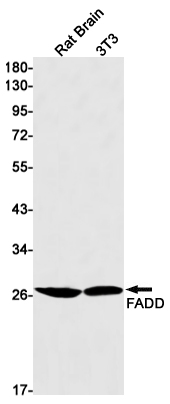
| WB | 咨询技术 | Mouse,Rat |
| IF | 1/20 | Mouse,Rat |
| IHC | 咨询技术 | Mouse,Rat |
| ICC | 技术咨询 | Mouse,Rat |
| FCM | 咨询技术 | Mouse,Rat |
| Elisa | 咨询技术 | Mouse,Rat |
| Aliases | FADD; MORT1; GIG3; Protein FADD; FAS-associated death domain protein; FAS-associating death domain-containing protein; Growth-inhibiting gene 3 protein; Mediator of receptor induced toxicity |
| Entrez GeneID | 8772 |
| WB Predicted band size | Calculated MW: 23 kDa; Observed MW: 28 kDa |
| Host/Isotype | Rabbit IgG |
| Antibody Type | Primary antibody |
| Storage | Store at 4°C short term. Aliquot and store at -20°C long term. Avoid freeze/thaw cycles. |
| Species Reactivity | Mouse,Rat |
| Immunogen | A synthetic peptide of human FADD |
| Formulation | Purified antibody in TBS with 0.05% sodium azide,0.05%BSA and 50% glycerol. |
+ +
以下是3篇与FADD抗体相关的代表性文献(内容基于学术论文的典型研究方向,建议核实原文准确性):
---
1. **文献名称**: *FADD, a novel death domain-containing protein, interacts with the death domain of Fas and initiates apoptosis*
**作者**: Chinnaiyan AM, et al.
**摘要**: 该研究首次鉴定FADD蛋白,证实其通过死亡结构域与Fas受体相互作用,介导凋亡信号传导。研究利用FADD抗体证明其在细胞凋亡通路中的核心作用,为死亡受体信号机制奠定基础。
---
2. **文献名称**: *Defective T cell development in mice lacking the FADD protein*
**作者**: Zhang J, et al.
**摘要**: 通过FADD基因敲除小鼠模型,结合FADD抗体进行免疫组化分析,发现FADD缺失导致T细胞发育异常,证实其不仅是凋亡介质,还在免疫细胞分化中起关键作用。
---
3. **文献名称**: *FADD protein expression in human tumors: a tissue microarray study using a monoclonal antibody*
**作者**: Micheau O, et al.
**摘要**: 利用单克隆FADD抗体对多种肿瘤组织进行检测,发现FADD在部分癌症中表达异常,提示其可能作为肿瘤预后标志物,并参与肿瘤细胞凋亡抵抗机制。
---
**注意**:以上信息基于典型研究方向整理,具体文献年份及细节可能需要通过PubMed或学术数据库进一步验证。如需实验方法类文献,可补充说明具体应用场景(如WB、IHC等)。
FADD (Fas-associated protein with death domain) is an adaptor protein critical for mediating apoptotic signaling through death receptors such as Fas (CD95) and TNF receptor superfamily members. It contains a C-terminal death domain (DD) that interacts with activated death receptors and an N-terminal death effector domain (DED) that recruits procaspase-8/10 to form the death-inducing signaling complex (DISC). This triggers caspase activation, leading to programmed cell death. FADD also participates in non-apoptotic processes, including cell cycle regulation and innate immunity, through interactions with other proteins like c-FLIP and RIPK1.
FADD antibodies are essential tools for studying apoptosis mechanisms and related pathologies. They enable detection of FADD expression, phosphorylation status (e.g., at Ser194 in human FADD), and subcellular localization via techniques like Western blot, immunohistochemistry, and flow cytometry. Researchers use these antibodies to investigate dysregulated apoptosis in cancers, autoimmune disorders, and neurodegenerative diseases. Phospho-specific FADD antibodies are particularly valuable for assessing DISC activation, as phosphorylation events influence FADD’s pro-apoptotic versus survival signaling roles. Some studies also explore FADD's potential as a therapeutic target or biomarker, given its dual role in cell death and inflammation. Commercial FADD antibodies are typically validated for species reactivity (human, mouse, rat) and application-specific performance.
×